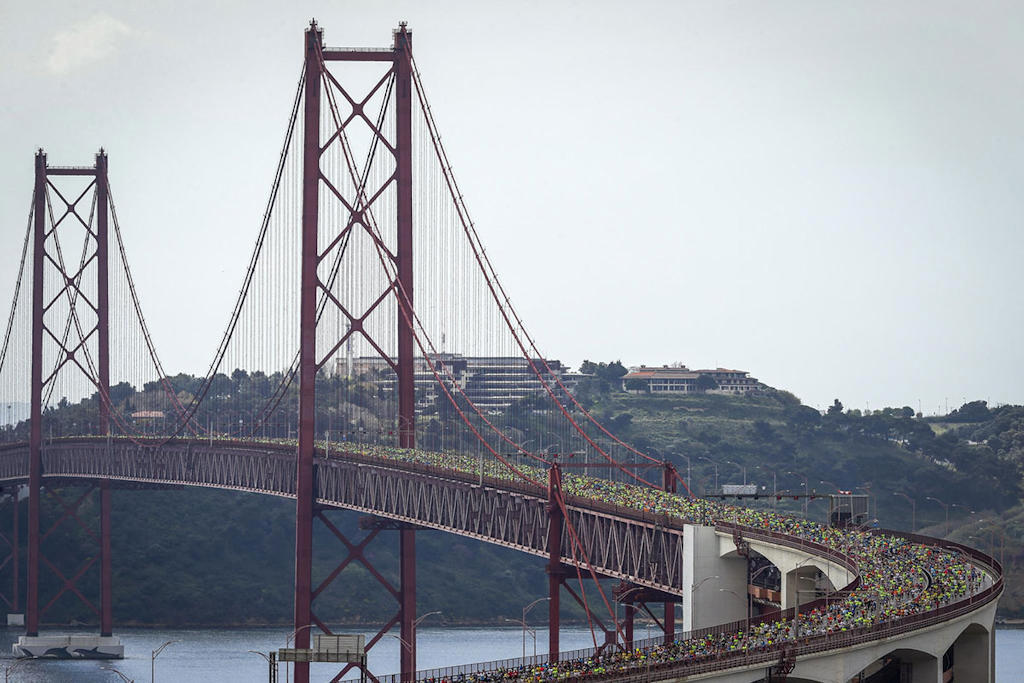The history of the Lisbon Half Marathon dates back to its inaugural edition in 1991. Since then, the race has been a consistent showcase of speed and athleticism, with many notable achievements and records set on its course. However, it is worth mentioning that some of the earlier times were deemed unratifiable for record purposes due to various factors such as course length discrepancies and excessive tailwinds.
In 2008, the organizers made significant changes to the race course in order to meet the requirements for record-eligible performances. The new course starts at sea level on the north side of the Tagus River, offering a flat and fast route for the elite runners. This modification has elevated the status of the Lisbon Half Marathon and attracted top-tier athletes seeking to set new records.
The current elite course of the half marathon begins in a small town on the north bank of the Tagus River, removing the need to cross the 25th of April Bridge (Ponte 25 de Abril) suspension bridge. From there, the course follows a wide and flat path, heading eastwards towards the city center. Runners pass by the historic docks and have the opportunity to admire the architectural wonders of Lisbon, including the iconic Belém Tower and the magnificent Jerónimos Monastery.
The Lisbon Half Marathon has also become renowned for its prestigious field of participants. Over the years, numerous world-class athletes have competed in the race, further elevating its status. In 2008, the legendary Haile Gebrselassie, holder of multiple marathon world records, claimed victory in the race. Other prominent athletes, such as Charles Kamathi and Robert Kipkoech Cheruiyot, have also left their mark on the event.
One of the unique aspects of the Lisbon Half Marathon is the inclusion of a mini marathon race. This allows not only elite runners but also thousands of recreational runners to participate and experience the thrill of running in a world-class event. The mini marathon has seen the participation of notable Portuguese citizens, including former President Jorge Sampaio and former Prime Minister José Socrates, showcasing the race's broad appeal and significance in the local community.
The EDP Lisbon Half Marathon has enjoyed longstanding sponsorship from Energias de Portugal, a leading energy company in the country. Their support has been instrumental in ensuring the success and continued growth of the event. The race has also garnered significant attention and acclaim from both the running community and the general public, solidifying its position as a must-attend event on the international running calendar.
The 2020 edition of the Lisbon Half Marathon faced unprecedented challenges due to the global COVID-19 pandemic. Initially scheduled for its usual March date, the race was first postponed to September and then rescheduled again to May 2021. These necessary measures were taken to prioritize the safety and well-being of participants, staff, and spectators. Despite the setbacks, the organizers remained committed to delivering an exceptional race experience once conditions allowed.
Lisbon.vip Recommends
Lisbon Half Marathon Winners
- 2022: Andualem Shiferaw (ETH) - 2:05:45 (Men's), Bornes Chepkirui (KEN) - 2:24:17 (Women's)
- 2021: Jacob Kiplimo (UGA) - 57:31 WR (Men's), Tsehay Gemechu (ETH) - 1:06:06 (Women's)
- 2020: Postponed to 2021 due to COVID-19 pandemic in Portugal
- 2019: Mosinet Geremew (ETH) - 59:37 (Men's), Vivian Cheruiyot (KEN) - 1:06:34 (Women's)
- 2018: Eric Kiptanui (KEN) - 1:00:05 (Men's), Etagegn Woldu (ETH) - 1:11:27 (Women's)
- 2017: Jake Robertson (NZL) - 1:00:01 (Men's), Mare Dibaba (ETH) - 1:09:43 (Women's)
- 2016: Sammy Kitwara (KEN) - 59:47 (Men's), Ruti Aga (ETH) - 1:09:16 (Women's)
- 2015: Mo Farah (GBR) - 59:32 (Men's), Rose Chelimo (KEN) - 1:08:22 (Women's)
- 2014: Bedan Karoki (KEN) - 59:58 (Men's), Worknesh Degefa (ETH) - 1:08:46 (Women's)
- 2013: Bernard Koech (KEN) - 59:54 (Men's), Edna Kiplagat (KEN) - 1:08:48 (Women's)
- 2012: Zersenay Tadese (ERI) - 59:34 (Men's), Shalane Flanagan (USA) - 1:08:52 (Women's)
- 2011: Zersenay Tadese (ERI) - 58:30 (Men's), Aberu Kebede (ETH) - 1:08:28 (Women's)
- 2010: Zersenay Tadese (ERI) - 58:23 WR (Men's), Peninah Arusei (KEN) - 1:08:38 (Women's)
- 2009: Martin Lel (KEN) - 59:56 (Men's), Kara Goucher (USA) - 1:08:30 (Women's)
- 2008: Haile Gebrselassie (ETH) - 59:15 (Men's), Salina Kosgei (KEN) - 1:09:57 (Women's)
- 2007: Robert Kipchumba (KEN) - 1:00:31 (Men's), Rita Jeptoo (KEN) - 1:07:05 (Women's)
- 2006: Martin Lel (KEN) - 59:30 (Men's), Salina Kosgei (KEN) - 1:07:52 (Women's)
- 2005: Paul Tergat (KEN) - 59:10 (Men's), Susan Chepkemei (KEN) - 1:08:49 (Women's)
- 2004: Rodgers Rop (KEN) - 59:49 (Men's), Joyce Chepchumba (KEN) - 1:08:11 (Women's)
- 2003: Martin Lel (KEN) - 1:00:10 (Men's), Derartu Tulu (ETH) - 1:09:20 (Women's)
- 2002: Haile Gebrselassie (ETH) - 59:41 (Men's), Susan Chepkemei (KEN) - 1:08:23 (Women's)
- 2001: Hendrick Ramaala (RSA) - 1:00:26 (Men's), Susan Chepkemei (KEN) - 1:05:44 (Women's)
- 2000: Paul Tergat (KEN) - 59:06 (Men's), Tegla Loroupe (KEN) - 1:07:23 (Women's)
- 1999: Japhet Kosgei (KEN) - 1:00:01 (Men's), Tegla Loroupe (KEN) - 1:07:52 (Women's)
- 1998: António Pinto (POR) - 59:43 (Men's), Catherina McKiernan (IRL) - 1:07:50 (Women's)
- 1997: Mohammed Mourhit (BEL) - 1:01:17 (Men's), Tegla Loroupe (KEN) - 1:09:01 (Women's)
- 1996: Clement Kiprotich (KEN) - 1:01:15 (Men's), Tegla Loroupe (KEN) - 1:07:12 (Women's)
- 1995: Simon Lopuyet (KEN) - 1:00:26 (Men's), Tegla Loroupe (KEN) - 1:08:21 (Women's)
- 1994: Andrés Espinosa (MEX) - 1:01:34 (Men's), Tegla Loroupe (KEN) - 1:09:27 (Women's)
- 1993: Sammy Lelei (KEN) - 59:24 (Men's), Nadezhda Ilyina (RUS) - 1:09:47 (Women's)
- 1992: Tendai Chimusasa (ZIM) - 1:01:17 (Men's), Heléna Barócsi (HUN) - 1:10:01 (Women's)
- 1991: Paul Evans (ENG) - 1:01:44 (Men's), Rosa Mota (POR) - 1:09:52 (Women's)



